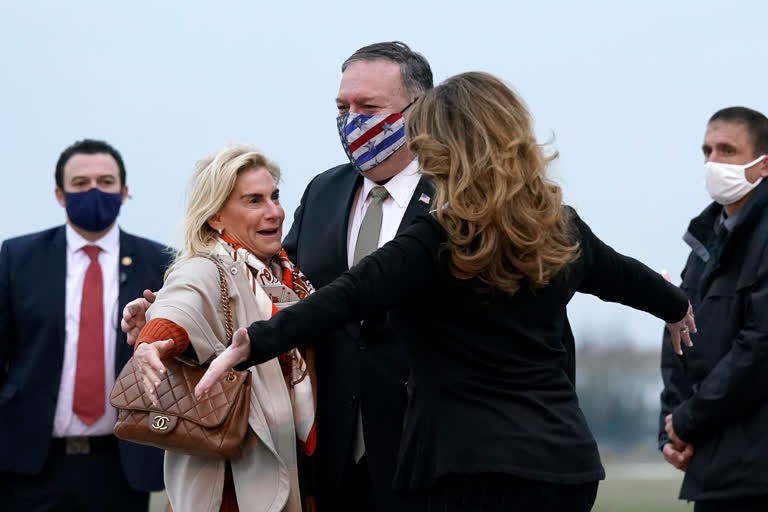Paris: U.S. Secretary of State Mike Pompeo arrived Saturday in Paris, at the start of a seven-country tour of Europe and the Middle East, travels that were certain to be awkward since all the nations on his schedule have congratulated Joe Biden for his victory in the U.S. presidential race.
The United States’ top diplomat — as well as its president and much of his Republican Party — have not accepted the results of the American election, and the unusual circumstances will likely overshadow the issues.
Low-key meetings were set for Saturday with civil society, academia and the private sector, according to a senior State Department official who was not authorized to speak publicly about Pompeo’s agenda. No details were provided.
French Foreign Minister Jean-Yves Le Drian noted on Friday the “difficult subjects” on the table, from the situation in Iraq and Iran, terrorism, the Middle East and China.
”For the moment, my counterpart is Mike Pompeo, until Jan. 20…,” Le Drian said on BFMTV, referring to the date when Trump’s term ends. “He’s coming to Paris. I receive him.”
Read:|Pompeo to leave on 7-nation trip to Europe & Asia
That meeting will take place Monday, Le Drian said, suggesting that Pompeo also will meet with French President Emmanuel Macron. Paris is amid a lockdown aimed at slowing the spread of the coronavirus.
The French president, who spoke with Biden four days ago to offer congratulations, has had a tense relationship with Trump. Both leaders initially worked to woo each other with gestures of extravagance, such as Macron making Trump the guest of honour at a Bastille Day military parade. Trump later pulled out of the Paris global climate accord, a blow to Macron.
The United States also left the hard-won Iran nuclear accord, and Pompeo said in a tweet before departing on his trip that “Iran's destabilizing behaviour” would be among topics of discussion.
In an arrival tweet Saturday in France, Pompeo laid out the standard diplomatic groundwork for his Paris talks, noting that France is the “oldest friend and ally” of the United States. “The strong relationship between our countries cannot be overestimated,” he tweeted.
Promoting religious freedom and countering terrorism were also among topics on the table during his trip, he tweeted. Both issues are keenly relevant to France. There have been three terror attacks in recent weeks in France that have killed four people, linked to recently republished caricatures of the prophet of Islam. Anti-France protests rolled through some Muslim countries after Macron insisted on his nation's respect for freedom of expression, including the right to draw caricatures.
After France, Pompeo’s tour takes him to Turkey, Georgia, Israel, the United Arab Emirates, Qatar and Saudi Arabia. The leaders of all of those countries have offered public congratulations to Biden.
Besides France, Turkey, Georgia and Qatar have had fractious relationships with the Trump administration, and it was not clear whether Pompeo planned public engagements with their leaders — or whether he would take questions from the press, with whom he has had a frosty relationship.
The administration’s relations with Turkey have been particularly strained after the NATO ally purchased a Russian missile defence system, and Pompeo’s stop in Istanbul next week will not include meetings with Turkish officials. Instead, Pompeo will meet with religious leaders to highlight his promotion of religious freedom.
Palestinian officials, who have been snubbed by the Trump administration, have denounced Pompeo’s plans to visit the West Bank settlement of Psagot. Palestinian Prime Minister Mohammad Shtayyeh tweeted on Friday that this was a “dangerous precedent” that legalizes settlements.
Read:|Denying Biden victory, Pompeo heads to Europe, Mideast
In keeping with Trump’s refusal to concede and orders for Cabinet agencies not to cooperate with the Biden transition team, the State Department has not been involved with facilitating Biden’s calls to foreign leaders, according to officials familiar with the process.
At a news conference Tuesday, Pompeo said he would carry on as if there was no change.
“I’m the secretary of state,” he said. “I’m getting calls from all across the world. These people are watching our election. They understand that we have a legal process. They understand that this takes time.”
Yet his French counterpart Le Drian has been looking toward the future, saying last Sunday in Cairo that “we will work with the new president of the United States and his team in the framework of new trans-Atlantic relations, we will need to re-found this.”
AP
